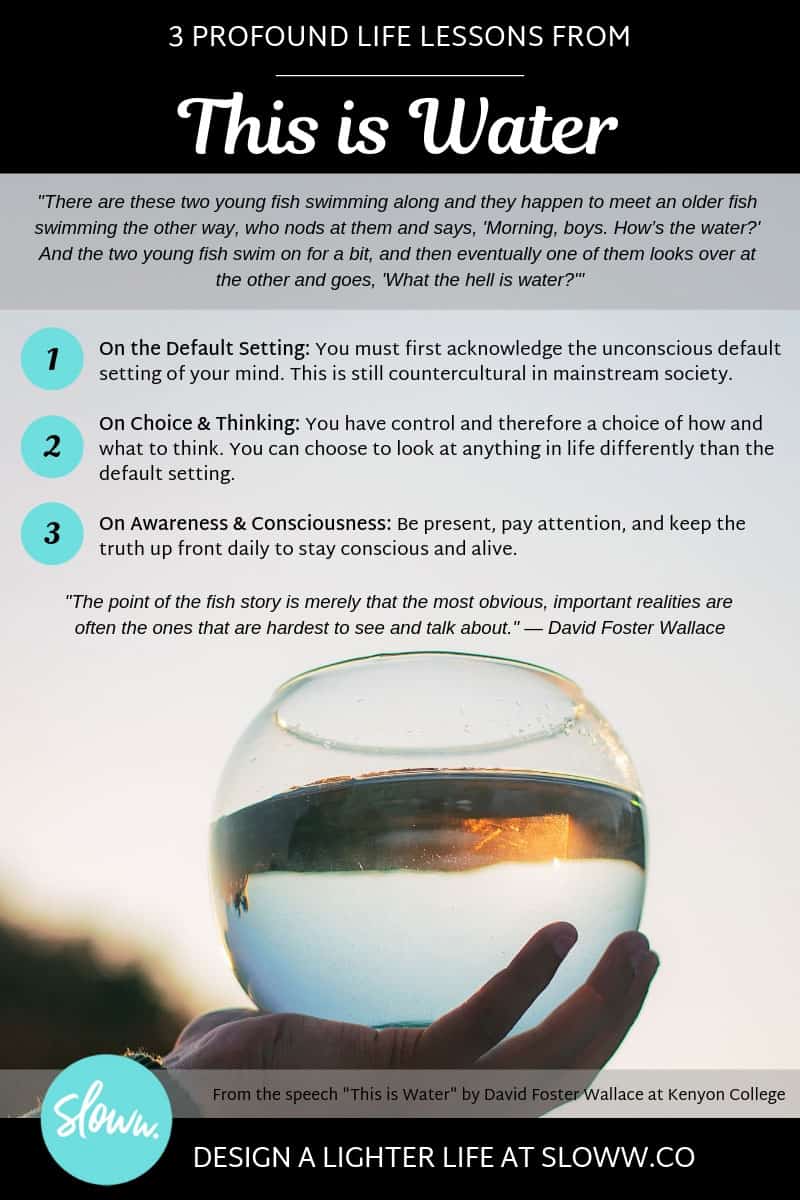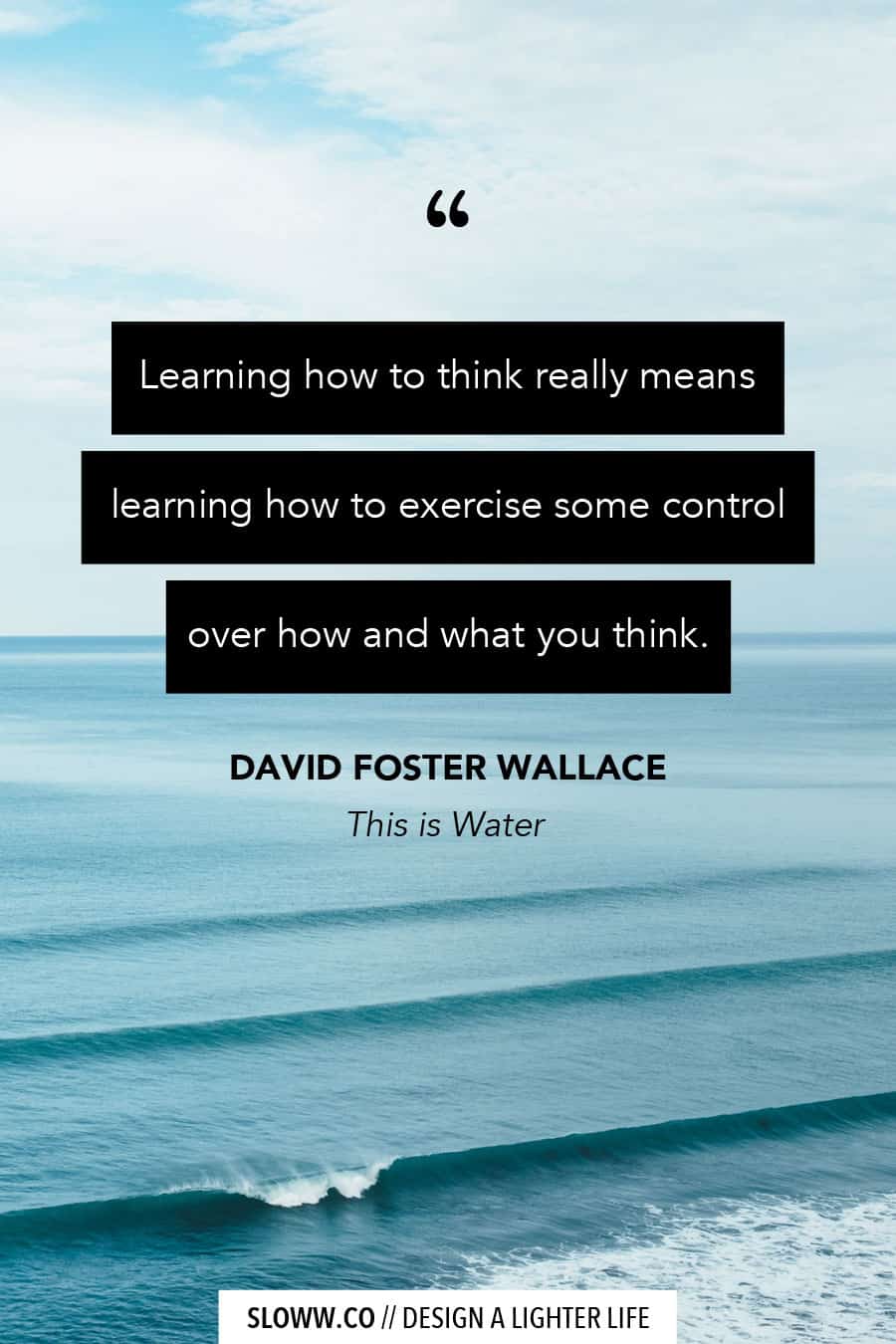In 2005, David Foster Wallace delivered the “This is Water” commencement speech at Kenyon College. I’ve studied and written about the most viewed commencement speeches in the past, but this one is special.
In just over 20 minutes, he covers the “unsexy” yet very real realities of day-to-day adult life. The graduating audience appears to laugh at various times in the speech, but I don’t think David Foster Wallace intended for any of it to be humorous. He’s calling out the “default setting” of the unconscious human minds that are all too common in mainstream society. The state of your own mind will determine how you live in the “day in and day out” and “day-to-day trenches of adult existence.”
While he pokes fun at “didactic little parable-ish stories” in commencement speeches, David Foster Wallace delivers one of the best. This post outlines my own personal interpretation of his speech.
If you’re interested, you can listen to the full speech here:

The Purpose of This is Water by David Foster Wallace
Here’s the gist of the “This is Water” story itself along with 3 simple life lessons we can all apply to our day-to-day existence (bold added throughout for emphasis).
The Purpose of the Fish Story:
- “There are these two young fish swimming along and they happen to meet an older fish swimming the other way, who nods at them and says, ‘Morning, boys. How’s the water?’ And the two young fish swim on for a bit, and then eventually one of them looks over at the other and goes, ‘What the hell is water?’“
- “If your total freedom of choice regarding what to think about seems too obvious to waste time discussing, I’d ask you to think about fish and water, and to bracket for just a few minutes your skepticism about the value of the totally obvious.”
- “The capital-T Truth is about life before death. It is about the real value of a real education, which has almost nothing to do with knowledge, and everything to do with simple awareness; awareness of what is so real and essential, so hidden in plain sight all around us, all the time, that we have to keep reminding ourselves over and over: ‘This is water.’ ‘This is water.’“
3 Profound Life Lessons from This is Water by David Foster Wallace

- “And I submit that this is what the real, no bullshit value of your liberal arts education is supposed to be about: how to keep from going through your comfortable, prosperous, respectable adult life dead, unconscious, a slave to your head and to your natural default setting of being uniquely, completely, imperially alone day in and day out.”
- “If I choose to think this way in a store and on the freeway, fine. Lots of us do. Except thinking this way tends to be so easy and automatic that it doesn’t have to be a choice. It is my natural default setting. It’s the automatic way that I experience the boring, frustrating, crowded parts of adult life when I’m operating on the automatic, unconscious belief that I am the centre of the world, and that my immediate needs and feelings are what should determine the world’s priorities.”
- “If you worship money and things, if they are where you tap real meaning in life, then you will never have enough, never feel you have enough.” (Note: See my own experience with lifestyle inflation.)
- “And the so-called real world will not discourage you from operating on your default settings, because the so-called real world of men and money and power hums merrily along in a pool of fear and anger and frustration and craving and worship of self.”
- “The really significant education in thinking that we’re supposed to get in a place like this isn’t really about the capacity to think, but rather about the choice of what to think about.”
- “The point is that petty, frustrating crap like this is exactly where the work of choosing is gonna come in.”
- “If I don’t make a conscious decision about how to think and what to pay attention to, I’m gonna be pissed and miserable every time I have to shop.”
- “Most days, if you’re aware enough to give yourself a choice, you can choose to look differently.”
- “The only thing that’s capital-T True is that you get to decide how you’re gonna try to see it.”
- “You get to consciously decide what has meaning and what doesn’t.”
- “Twenty years after my own graduation, I have come gradually to understand that the liberal arts cliché about teaching you how to think is actually shorthand for a much deeper, more serious idea: learning how to think really means learning how to exercise some control over how and what you think. It means being conscious and aware enough to choose what you pay attention to and to choose how you construct meaning from experience. Because if you cannot exercise this kind of choice in adult life, you will be totally hosed.”
- “Probably the most dangerous thing about an academic education—least in my own case—is that it enables my tendency to over-intellectualize stuff, to get lost in abstract argument inside my head, instead of simply paying attention to what is going on right in front of me, paying attention to what is going on inside me.”
- “If you’re automatically sure that you know what reality is, and you are operating on your default setting, then you, like me, probably won’t consider possibilities that aren’t annoying and miserable. But if you really learn how to pay attention, then you will know there are other options. It will actually be within your power to experience a crowded, hot, slow, consumer-hell type situation as not only meaningful, but sacred, on fire with the same force that made the stars: love, fellowship, the mystical oneness of all things deep down.”
- “The whole trick is keeping the truth up front in daily consciousness.”
- “It is unimaginably hard to do this, to stay conscious and alive in the adult world day in and day out.”
How are you doing on these three life lessons? Do you acknowledge your default setting? Are you exercising control and choice over your mind? How about paying attention and staying present?
- “The really important kind of freedom involves attention and awareness and discipline, and being able truly to care about other people and to sacrifice for them over and over in myriad petty, unsexy ways every day. That is real freedom. That is being educated, and understanding how to think. The alternative is unconsciousness, the default setting, the rat race, the constant gnawing sense of having had, and lost, some infinite thing.”





